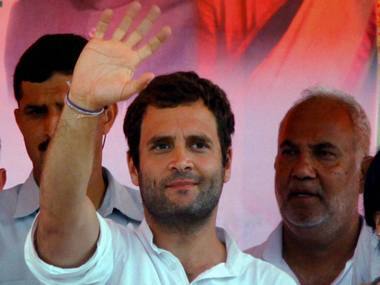Rahul Gandhi was the first among Indian politicians who not only thought there was something to learn from the Aam Aadmi Party’s success story in Delhi, but also followed it up with some specific steps targeting a moral high ground. However, what he didn’t realise in his apparent enthusiasm to undertake cosmetic changes in his party is the possible resistance by its old guard and the countrywide apparatus that have been bred in an anti-people, subversive culture. The “advice” by home minister Sushil Kumar Shinde to Kejriwal on Sunday is a brilliant example of this irony: while Rahul takes on corruption and the Congress’s own Maharashtra government, not to be eclipsed by the glitter of the AAP, Shinde asks Kejriwal to emulate Manmohan Singh on how to run a coalition government. [caption id=“attachment_131389” align=“alignleft” width=“380”]  PTI[/caption] Quoting Manmohan to Kejriwal essentially scoffs at Rahul’s newfound commitment to a new politics because the former’s government is credited with some of the worst scams in independent India, and a dubious coalition strategy. In fact, Manmohan Singh should be an example on how not to run a government in a democracy with partners who appear to have no common public interest other than power and aggrandisement. Moreover, by providing unsolicited advice to Kejriwal on coalitions, Shinde assumes that the AAP is in coalition with the Congress. When did Kejriwal say that he is in alliance with the Congress or that he ask for its support? This advice by Shinde also smacks of the old school strategy - first offer unconditional support, make it conditional, and finally behave like a coalition partner. Rahul, at least for public consumption, has expressed his willingness to change; but people such as Shinde want to drag everyone into the cesspool that they think is unavoidable for practical politics. This is Rahul’s chance to redeem himself from the incompetency and inertia that have been generously attributed to him. The only option for him is to seize this opportunity and ask people such as Shinde to shut up. In fact, his party’s biggest folly was to install Manmohan Singh as the Prime Minister that led to the rule of a technocratic elite with neither the interest nor the skills to handle the political office. Under Manmohan Singh, the Congress even nurtured this philosophy further by bringing in more technocrats to key positions. Had Rahul been serious about his role in the Congress, he, or people close to him, should have opposed a technocratic prime minister. Under a smart political PMO, he could have used the last five years to cut his teeth to take on the mantle the way Indira Gandhi was trained under Nehru. After all, Indira Gandhi too had been dubbed incompetent initially. C Rajagopalachari’s comments on Indira Gandhi, quoted by MO Mathai in his “Reminiscences of the Nehru Age”, was in fact a reflection of this perception: “I have known that girl as a child in her mother’s arms. She has not grown since the age of two. She has nothing of the father in her.” Ram Manohar Lohia had called her a “mute doll”. The same Indira Gandhi went on to rule India from 1966 till she died in 1984, except for a post-emergency gap of three years in between. The criticism of Rahul is not any worse. The dismissiveness of him by political pundits is understandable because so far he hasn’t shown any signs of a consistent desire to transform and lead his party. If he is serious, this is the moment. Emulate the AAP, even risking the ignominy of being a copycat, and purge the dirt. If he is unable to do it retroactively because that will bring down the edifice forever, he should at least try to secure its future. If Rahul is looking for redemption, his competition should be with Kejriwal and not with the BJP. In “The Wisdom of Crowds” (which apparently finds a place in Kejriwal’s bookshelf at home) author James Surowiecki writes: “One essential ingredient of healthy democracy is competition. Competition makes it more likely that politicians will make good decisions by making it more likely that they will be punished when they don’t. Surowiecki goes on to add: “Politics is ultimately about the impact of government on the every-day lives of citizens. It seems strange, then, to think that the way to do politics well is to distance yourself as much as possible from citizens’ everyday lives.” When there is a field-tested model, why not rip, mix and personalise?
Dismissing Rahul is understandable because he hasn’t shown any signs of a consistent desire to transform his party. If he is serious, this is the moment: Emulate AAP.
Advertisement
End of Article


)
)
)
)
)
)
)
)
)



